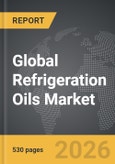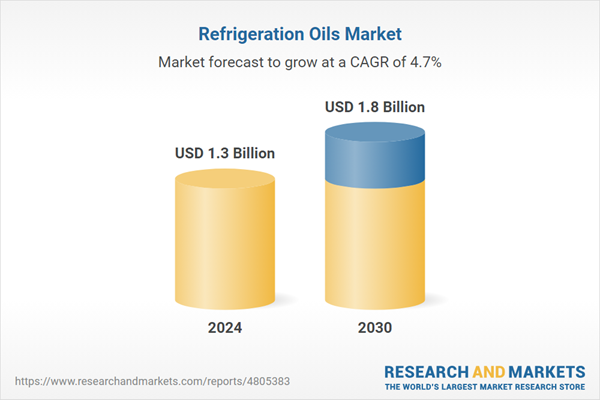Global Refrigeration Oils Market - Key Trends and Drivers Summarized
Refrigeration Oils: Lubricating the Heart of Cooling Systems
Refrigeration oils are essential for the efficient operation and longevity of cooling systems, including air conditioners, refrigerators, and industrial refrigeration units. These oils serve as lubricants for the compressors in refrigeration systems, reducing friction between moving parts and preventing wear and tear. By ensuring smooth operation, refrigeration oils help maintain the efficiency of the system, reduce energy consumption, and prevent mechanical failures that could lead to costly downtime. Additionally, refrigeration oils play a critical role in heat transfer within the system, facilitating the removal of heat from the refrigerant and contributing to the overall cooling process. The selection of the right refrigeration oil is crucial, as it must be compatible with the refrigerant used and capable of performing effectively under the system's operating conditions.What Technological Developments Are Enhancing Refrigeration Oils?
Technological advancements are significantly enhancing the performance and environmental impact of refrigeration oils. One key development is the formulation of synthetic refrigeration oils, which offer superior lubrication properties, better thermal stability, and longer service life compared to traditional mineral oils. These synthetic oils are particularly well-suited for use in systems with high operating pressures and temperatures, such as those using modern refrigerants like hydrofluorocarbons (HFCs) and hydrofluoroolefins (HFOs). Additionally, advancements in additive technology have improved the performance of refrigeration oils by enhancing their anti-wear, anti-corrosion, and viscosity control properties. These additives help maintain the oil's effectiveness over a wide range of temperatures and operating conditions, ensuring consistent performance and protection for the compressor. Moreover, the development of environmentally friendly refrigeration oils that are compatible with low-GWP refrigerants is helping the industry meet stringent environmental regulations and reduce its carbon footprint.What Are the Key Applications and Benefits of Refrigeration Oils?
Refrigeration oils are used in a wide range of cooling systems across various industries, offering significant benefits that are critical to system performance and reliability. In residential and commercial air conditioning systems, refrigeration oils ensure the smooth operation of compressors, preventing breakdowns and extending the lifespan of the equipment. In the food and beverage industry, where large-scale refrigeration systems are used for storage and processing, refrigeration oils play a vital role in maintaining the efficiency and reliability of the cooling process, ensuring that perishable goods are stored at the correct temperatures. Industrial refrigeration systems, which are used in manufacturing, chemical processing, and cold storage facilities, also rely on high-performance refrigeration oils to operate effectively under demanding conditions. The primary benefits of refrigeration oils include improved system efficiency, reduced energy consumption, extended equipment lifespan, and protection against mechanical wear and corrosion. These advantages make refrigeration oils an essential component in the maintenance and operation of cooling systems.What Factors Are Driving the Growth in the Refrigeration Oils Market?
The growth in the Refrigeration Oils market is driven by several factors. The increasing demand for cooling systems in residential, commercial, and industrial applications is a significant driver, as these systems require high-quality oils to operate efficiently and reliably. Technological advancements, such as the development of synthetic oils and advanced additives, are also propelling market growth by enhancing the performance and durability of refrigeration oils. The growing focus on environmental sustainability is further boosting demand for environmentally friendly oils that are compatible with low-GWP refrigerants. Additionally, the expansion of industries such as food and beverage, pharmaceuticals, and cold chain logistics is contributing to market growth, as these sectors rely heavily on refrigeration systems to maintain product quality and safety. These factors, combined with the continuous innovation in oil formulation and technology, are driving the sustained growth of the Refrigeration Oils market.Report Scope
The report analyzes the Refrigeration Oils market, presented in terms of market value (USD). The analysis covers the key segments and geographic regions outlined below.- Segments: Type (Synthetic Refrigeration Oils, Mineral Refrigeration Oils); Application (Refrigerators Application, Air Conditioners Application, Automotive Application, Other Applications).
- Geographic Regions/Countries: World; United States; Canada; Japan; China; Europe (France; Germany; Italy; United Kingdom; Spain; Russia; and Rest of Europe); Asia-Pacific (Australia; India; South Korea; and Rest of Asia-Pacific); Latin America (Argentina; Brazil; Mexico; and Rest of Latin America); Middle East (Iran; Israel; Saudi Arabia; United Arab Emirates; and Rest of Middle East); and Africa.
Key Insights:
- Market Growth: Understand the significant growth trajectory of the Synthetic Refrigeration Oils segment, which is expected to reach US$1.2 Billion by 2030 with a CAGR of 5.4%. The Mineral Refrigeration Oils segment is also set to grow at 3.1% CAGR over the analysis period.
- Regional Analysis: Gain insights into the U.S. market, valued at $292.5 Million in 2024, and China, forecasted to grow at an impressive 6.5% CAGR to reach $279.5 Million by 2030. Discover growth trends in other key regions, including Japan, Canada, Germany, and the Asia-Pacific.
Why You Should Buy This Report:
- Detailed Market Analysis: Access a thorough analysis of the Global Refrigeration Oils Market, covering all major geographic regions and market segments.
- Competitive Insights: Get an overview of the competitive landscape, including the market presence of major players across different geographies.
- Future Trends and Drivers: Understand the key trends and drivers shaping the future of the Global Refrigeration Oils Market.
- Actionable Insights: Benefit from actionable insights that can help you identify new revenue opportunities and make strategic business decisions.
Key Questions Answered:
- How is the Global Refrigeration Oils Market expected to evolve by 2030?
- What are the main drivers and restraints affecting the market?
- Which market segments will grow the most over the forecast period?
- How will market shares for different regions and segments change by 2030?
- Who are the leading players in the market, and what are their prospects?
Report Features:
- Comprehensive Market Data: Independent analysis of annual sales and market forecasts in US$ Million from 2024 to 2030.
- In-Depth Regional Analysis: Detailed insights into key markets, including the U.S., China, Japan, Canada, Europe, Asia-Pacific, Latin America, Middle East, and Africa.
- Company Profiles: Coverage of players such as BASF SE, Behr Hella Service GmbH, BP PLC, Bva, Inc., Calumet Specialty Products Partners LP and more.
- Complimentary Updates: Receive free report updates for one year to keep you informed of the latest market developments.
Some of the 74 companies featured in this Refrigeration Oils market report include:
- BASF SE
- Behr Hella Service GmbH
- BP PLC
- Bva, Inc.
- Calumet Specialty Products Partners LP
- Camco Lubricants
- Chevron Corporation
- China Petrochemical Corporation (Sinopec Group)
- CITGO Petroleum Corporation
- Cosmo Oil Lubricants Co., Ltd.
- ExxonMobil Corporation
- Fuchs Petrolub SE
- Indian Oil Corporation Ltd.
- Isel Germany AG
- Lubriplate Lubricants Company
- LUKOIL Lubricants Company
- National Refrigerants, Inc.
- Petro-Canada Lubricants, Inc.
- Petroliam Nasional Berhad (PETRONAS)
- Phillips 66 Lubricants
- Royal Dutch Shell PLC
- Sun Company
- The Lubrizol Corporation
- Total SA
This edition integrates the latest global trade and economic shifts into comprehensive market analysis. Key updates include:
- Tariff and Trade Impact: Insights into global tariff negotiations across 180+ countries, with analysis of supply chain turbulence, sourcing disruptions, and geographic realignment. Special focus on 2025 as a pivotal year for trade tensions, including updated perspectives on the Trump-era tariffs.
- Adjusted Forecasts and Analytics: Revised global and regional market forecasts through 2030, incorporating tariff effects, economic uncertainty, and structural changes in globalization. Includes historical analysis from 2015 to 2023.
- Strategic Market Dynamics: Evaluation of revised market prospects, regional outlooks, and key economic indicators such as population and urbanization trends.
- Innovation & Technology Trends: Latest developments in product and process innovation, emerging technologies, and key industry drivers shaping the competitive landscape.
- Competitive Intelligence: Updated global market share estimates for 2025, competitive positioning of major players (Strong/Active/Niche/Trivial), and refined focus on leading global brands and core players.
- Expert Insight & Commentary: Strategic analysis from economists, trade experts, and domain specialists to contextualize market shifts and identify emerging opportunities.
Table of Contents
Companies Mentioned (Partial List)
A selection of companies mentioned in this report includes, but is not limited to:
- BASF SE
- Behr Hella Service GmbH
- BP PLC
- Bva, Inc.
- Calumet Specialty Products Partners LP
- Camco Lubricants
- Chevron Corporation
- China Petrochemical Corporation (Sinopec Group)
- CITGO Petroleum Corporation
- Cosmo Oil Lubricants Co., Ltd.
- ExxonMobil Corporation
- Fuchs Petrolub SE
- Indian Oil Corporation Ltd.
- Isel Germany AG
- Lubriplate Lubricants Company
- LUKOIL Lubricants Company
- National Refrigerants, Inc.
- Petro-Canada Lubricants, Inc.
- Petroliam Nasional Berhad (PETRONAS)
- Phillips 66 Lubricants
- Royal Dutch Shell PLC
- Sun Company
- The Lubrizol Corporation
- Total SA
Table Information
| Report Attribute | Details |
|---|---|
| No. of Pages | 530 |
| Published | February 2026 |
| Forecast Period | 2024 - 2030 |
| Estimated Market Value ( USD | $ 1.3 Billion |
| Forecasted Market Value ( USD | $ 1.8 Billion |
| Compound Annual Growth Rate | 4.7% |
| Regions Covered | Global |









